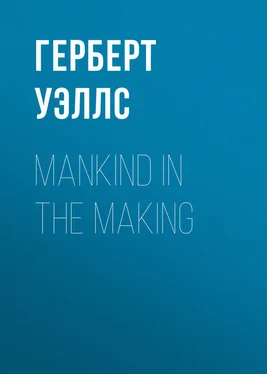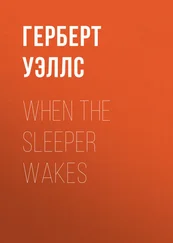Герберт Уэллс - Mankind in the Making
Здесь есть возможность читать онлайн «Герберт Уэллс - Mankind in the Making» — ознакомительный отрывок электронной книги совершенно бесплатно, а после прочтения отрывка купить полную версию. В некоторых случаях можно слушать аудио, скачать через торрент в формате fb2 и присутствует краткое содержание. Жанр: Философия, foreign_prose, на английском языке. Описание произведения, (предисловие) а так же отзывы посетителей доступны на портале библиотеки ЛибКат.
- Название:Mankind in the Making
- Автор:
- Жанр:
- Год:неизвестен
- ISBN:нет данных
- Рейтинг книги:4 / 5. Голосов: 1
-
Избранное:Добавить в избранное
- Отзывы:
-
Ваша оценка:
- 80
- 1
- 2
- 3
- 4
- 5
Mankind in the Making: краткое содержание, описание и аннотация
Предлагаем к чтению аннотацию, описание, краткое содержание или предисловие (зависит от того, что написал сам автор книги «Mankind in the Making»). Если вы не нашли необходимую информацию о книге — напишите в комментариях, мы постараемся отыскать её.
Mankind in the Making — читать онлайн ознакомительный отрывок
Ниже представлен текст книги, разбитый по страницам. Система сохранения места последней прочитанной страницы, позволяет с удобством читать онлайн бесплатно книгу «Mankind in the Making», без необходимости каждый раз заново искать на чём Вы остановились. Поставьте закладку, и сможете в любой момент перейти на страницу, на которой закончили чтение.
Интервал:
Закладка:
So much for the existing possibilities of making the race better by breeding. For the rest of these papers we shall take the births into the world, for the most part, as we find them.
[Mr. Stuart Menteath remarks apropos of this question of the reproduction of exceptional people that it is undesirable to suggest voluntary extinction in any case. If a man, thinking that his family is “tainted,” displays so much foresighted patriotism, humility, and lifelong self-denial as to have no children, the presumption is that the loss to humanity by the discontinuance of such a type is greater than the gain. “Conceit in smallest bodies strongest works,” and it does not follow that a sense of one’s own excellence justifies one’s utmost fecundity or the reverse. Mr. Vrooman, who, with Mrs. Vrooman, founded Ruskin Hall at Oxford, writes to much the same effect. He argues that people intelligent enough and moral enough to form such resolutions are just the sort of people who ought not to form them. Mr. Stuart Menteath also makes a most admirable suggestion with regard to male and female geniuses who are absorbed in their careers. Although the genius may not have or rear a large family, something might be done to preserve the stock by assisting his or her brothers and sisters to support and educate their children.]
III. CERTAIN WHOLESALE ASPECTS OF MAN-MAKING
§ 1
With a skin of infinite delicacy that life will harden very speedily, with a discomforted writhing little body, with a weak and wailing outcry that stirs the heart, the creature comes protesting into the world, and unless death win a victory, we and chance and the forces of life in it, make out of that soft helplessness a man. Certain things there are inevitable in that man and unalterable, stamped upon his being long before the moment of his birth, the inherited things, the inherent things, his final and fundamental self. This is his “heredity,” his incurable reality, the thing that out of all his being, stands the test of survival and passes on to his children. Certain things he must be, certain things he may be, and certain things are for ever beyond his scope. That much his parentage defines for him, that is the natural man.
But, in addition, there is much else to make up the whole adult man as we know him. There is all that he has learnt since his birth, all that he has been taught to do and trained to do, his language, the circle of ideas he has taken to himself, the disproportions that come from unequal exercise and the bias due to circumambient suggestion. There are a thousand habits and a thousand prejudices, powers undeveloped and skill laboriously acquired. There are scars upon his body, and scars upon his mind. All these are secondary things, things capable of modification and avoidance; they constitute the manufactured man, the artificial man. And it is chiefly with all this superposed and adherent and artificial portion of a man that this and the following paper will deal. The question of improving the breed, of raising the average human heredity we have discussed and set aside. We are going to draw together now as many things as possible that bear upon the artificial constituent, the made and controllable constituent in the mature and fully-developed man. We are going to consider how it is built up and how it may be built up, we are going to attempt a rough analysis of the whole complex process by which the civilized citizen is evolved from that raw and wailing little creature.
Before his birth, at the very moment when his being becomes possible, the inherent qualities and limitations of a man are settled for good and all, whether he will be a negro or a white man, whether he will be free or not of inherited disease, whether he will be passionate or phlegmatic or imaginative or six-fingered or with a snub or aquiline nose. And not only that, but even before his birth the qualities that are not strictly and inevitably inherited are also beginning to be made. The artificial, the avoidable handicap also, may have commenced in the worrying, the overworking or the starving of his mother. In the first few months of his life very slight differences in treatment may have life-long consequences. No doubt there is an extraordinary recuperative power in very young children; if they do not die under neglect or ill-treatment they recover to an extent incomparably greater than any adult could do, but there remains still a wide marginal difference between what they become and what they might have been. With every year of life the recuperative quality diminishes, the initial handicap becomes more irrevocable, the effects of ill-feeding, of unwholesome surroundings, of mental and moral infections, become more inextricably a part of the growing individuality. And so we may well begin our study by considering the circumstances under which the opening phase, the first five years of life, are most safely and securely passed.
Food, warmth, cleanliness and abundant fresh air there must be from the first, and unremitting attention, such attention as only love can sustain. And in addition there must be knowledge. It is a pleasant superstition that Nature (who in such connections becomes feminine and assumes a capital N) is to be trusted in these matters. It is a pleasant superstition to which, some of us, under the agreeable counsels of sentimental novelists, of thoughtless mercenary preachers, and ignorant and indolent doctors, have offered up a child or so. We are persuaded to believe that a mother has an instinctive knowledge of whatever is necessary for a child’s welfare, and the child, until it reaches the knuckle-rapping age at least, an instinctive knowledge of its own requirements. Whatever proceedings are most suggestive of an ideal naked savage leading a “natural” life, are supposed to be not only more advantageous to the child but in some mystical way more moral. The spectacle of an undersized porter-fed mother, for example, nursing a spotted and distressful baby, is exalted at the expense of the clean and simple artificial feeding that is often advisable to-day. Yet the mortality of first-born children should indicate that a modern woman carries no instinctive system of baby management about with her in her brain, even if her savage ancestress had anything of the sort, and both the birth rate and the infantile death rate of such noble savages as our civilization has any chance of observing, suggest a certain generous carelessness, a certain spacious indifference to individual misery, rather than a trustworthy precision of individual guidance about Nature’s way.
This cant of Nature’s trustworthiness is partly a survival of the day of Rousseau and Sturm (of the Reflections), when untravelled men, orthodox and unorthodox alike, in artificial wigs, spouted in unison in this regard; partly it is the half instinctive tactics of the lax and lazy-minded to evade trouble and austerities. The incompetent medical practitioner, incapable of regimen, repeats this cant even to-day, though he knows full well that, left to Nature, men over-eat themselves almost as readily as dogs, contract a thousand diseases and exhaust their last vitality at fifty, and that half the white women in the world would die with their first children still unborn. He knows, too, that to the details of such precautionary measures as vaccination, for example, instinct is strongly opposed, and that drainage and filterage and the use of soap in washing are manifestly unnatural things. That large, naked, virtuous, pink, Natural Man, drinking pure spring water, eating the fruits of the earth, and living to ninety in the open air is a fantasy; he never was nor will be. The real savage is a nest of parasites within and without, he smells, he rots, he starves. Forty is a great age for him. He is as full of artifice as his civilized brother, only not so wise. As for his moral integrity, let the curious inquirer seek an account of the Tasmanian, or the Australian, or the Polynesian before “sophistication” came.
Читать дальшеИнтервал:
Закладка:
Похожие книги на «Mankind in the Making»
Представляем Вашему вниманию похожие книги на «Mankind in the Making» списком для выбора. Мы отобрали схожую по названию и смыслу литературу в надежде предоставить читателям больше вариантов отыскать новые, интересные, ещё непрочитанные произведения.
Обсуждение, отзывы о книге «Mankind in the Making» и просто собственные мнения читателей. Оставьте ваши комментарии, напишите, что Вы думаете о произведении, его смысле или главных героях. Укажите что конкретно понравилось, а что нет, и почему Вы так считаете.












